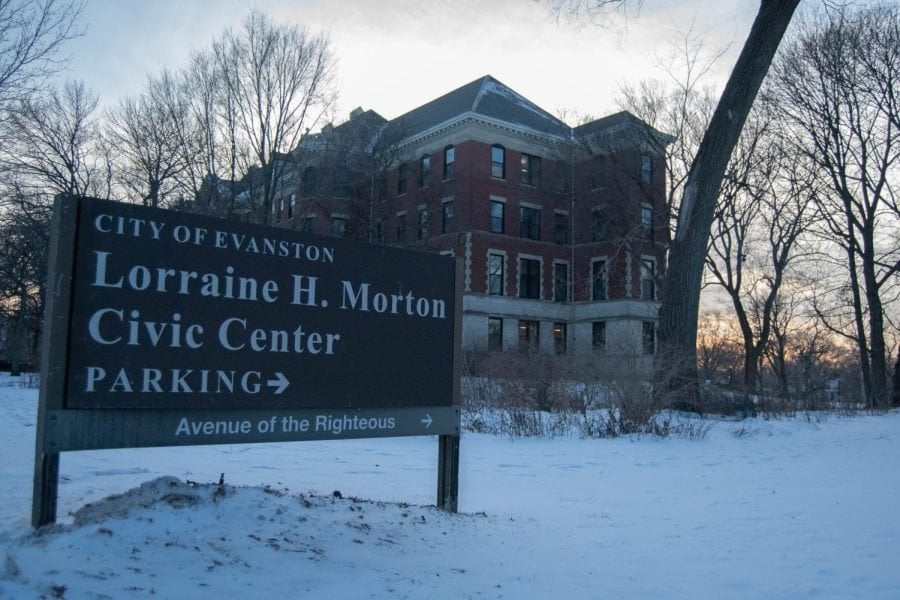City Council allocates funds for walk-in mental health crisis center
Daily file photo by Angeli Mittal
The Lorraine H. Morton Civic Center. Over 8,600 registered to vote in the participatory budgeting election, representing 8.11% of the city’s population.
March 29, 2022
City Council voted unanimously to fund the development of a walk-in mental health crisis center in Evanston with up to $900,000 from the American Rescue Plan Act on Monday.
Designed to emulate the cozy feeling of a living room, the Living Room Program will offer a free alternative to hospitalization and law enforcement intervention for people experiencing mental health crises. The Living Room offers guests the opportunity to talk to specialists who have personal experience with mental illness, and will also partner with community organizations to provide additional services.
Turning Point Behavioral Health Care Center, an outpatient mental health center, will operate Evanston’s Living Room out of a house on Elmwood Avenue leased from the neighboring AMITA Health Saint Francis Hospital Evanston. Turning Point has run a similar Living Room in Skokie for about 10 years.
Christine Somervill, co-chair of Evanston’s Mental Health Task Force and director of programs at National Alliance on Mental Illness Cook County North Suburban, said the facility is an opportunity to fill a gap in mental health care.
“We hope the city will become a model for mitigating mental health crises, beginning with the Living Room,” Somervill said.
The Evanston Living Room Program will partner with several community organizations, including Impact Behavioral Health Partners for employment services and PEER Services for substance abuse treatment, according to Ann Raney, Turning Point’s chief executive officer.
In addition to clinicians, recovery support specialists — who have experience with mental illness themselves — take the lead on conversations with patients at the Living Room, checking in with each other while sharing experiences and problem-solving strategies.
Emergency room visits often incur both cost and anxiety for patients, she said, which Living Room helps them avoid.
“We have a 99% success rate over 10 years of keeping people out of a higher level of care,” Raney told The Daily. “The thing that I think is really special about the Living Room is that we’re returning people to their homes and their work and their families.”
Evanston received $43 million from the American Rescue Plan Act of 2021, which allocated funds to municipalities nationwide for pandemic recovery. The money for the Living Room will come from the almost $1.5 million in ARPA funding City Council dedicated to public health.
Monday’s vote allocates a maximum of $250,000 to AMITA St. Francis for renovating or building additional space and $650,000 to Turning Point. The partnership agreement specifies the property will be ready for use within 12 months of signing, and Turning Point should have it operational within 14 months.
The allocated funds cover the costs of about a year of services, as well as a remodel of the center’s future home on Elmwood Avenue.
At the meeting, Ald. Jonathan Nieuwsma (4th) asked Raney how the Living Room will receive funding long-term.
Raney said she intends to apply for a state grant to cover the Evanston program at the end of the 2023 fiscal year, when Living Room contracts in Illinois are up for renewal. The state currently has 23 Living Rooms, Raney and Somervill said, operated by several different companies.
In response to Nieuwsma, Interim City Manager Kelley Gandurski said the Living Room may alleviate hospital patient loads.
“If this is a significant cost savings to our area hospitals, they should be very motivated to make sure this project succeeds,” Gandurski said. “I call this urgent care for the mind.”
Ald. Peter Braithwaite (2nd) expressed concern about managing safety outside the Living Room building. He also emphasized the importance of reserving resources for Evanston residents, noting Chicago residents might use the services meant for locals.
Raney told Braithwaite the Skokie Living Room has never needed outside support for altercations outside the building. She also told The Daily Turning Point’s Living Room does not check where patients live before deciding to offer services.
“In the Living Room, we really do want to welcome people as guests,” Raney told The Daily. “We really do want to learn from them.”
Email: [email protected]
Twitter: @avivabechky
Email: [email protected]
Twitter: @clarezhang_
Related Stories:
— City Council discusses “Living Rooms,” an alternative response to mental health crises
— First-response Alternative Crisis Team provides mental health support to people in crisis


